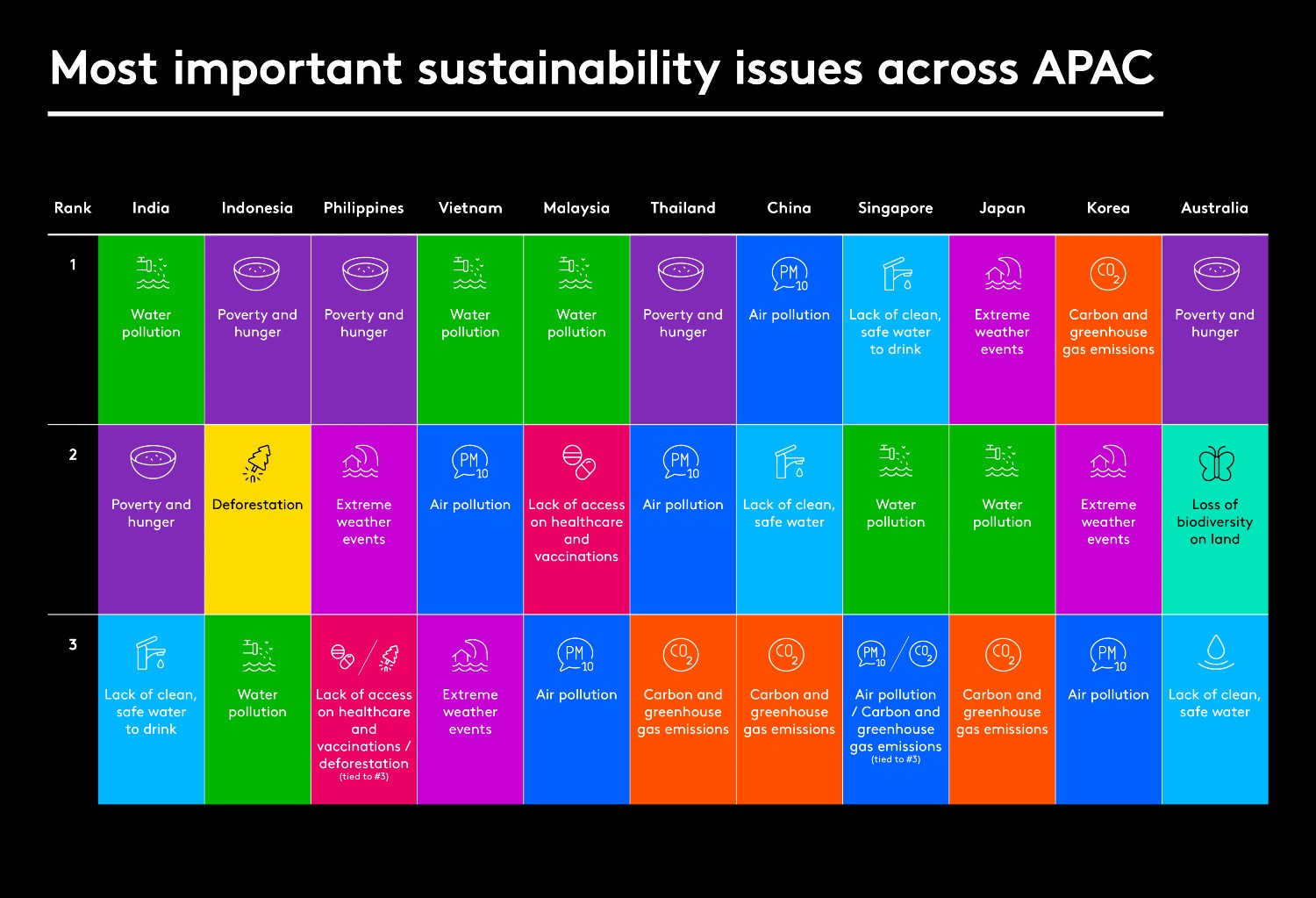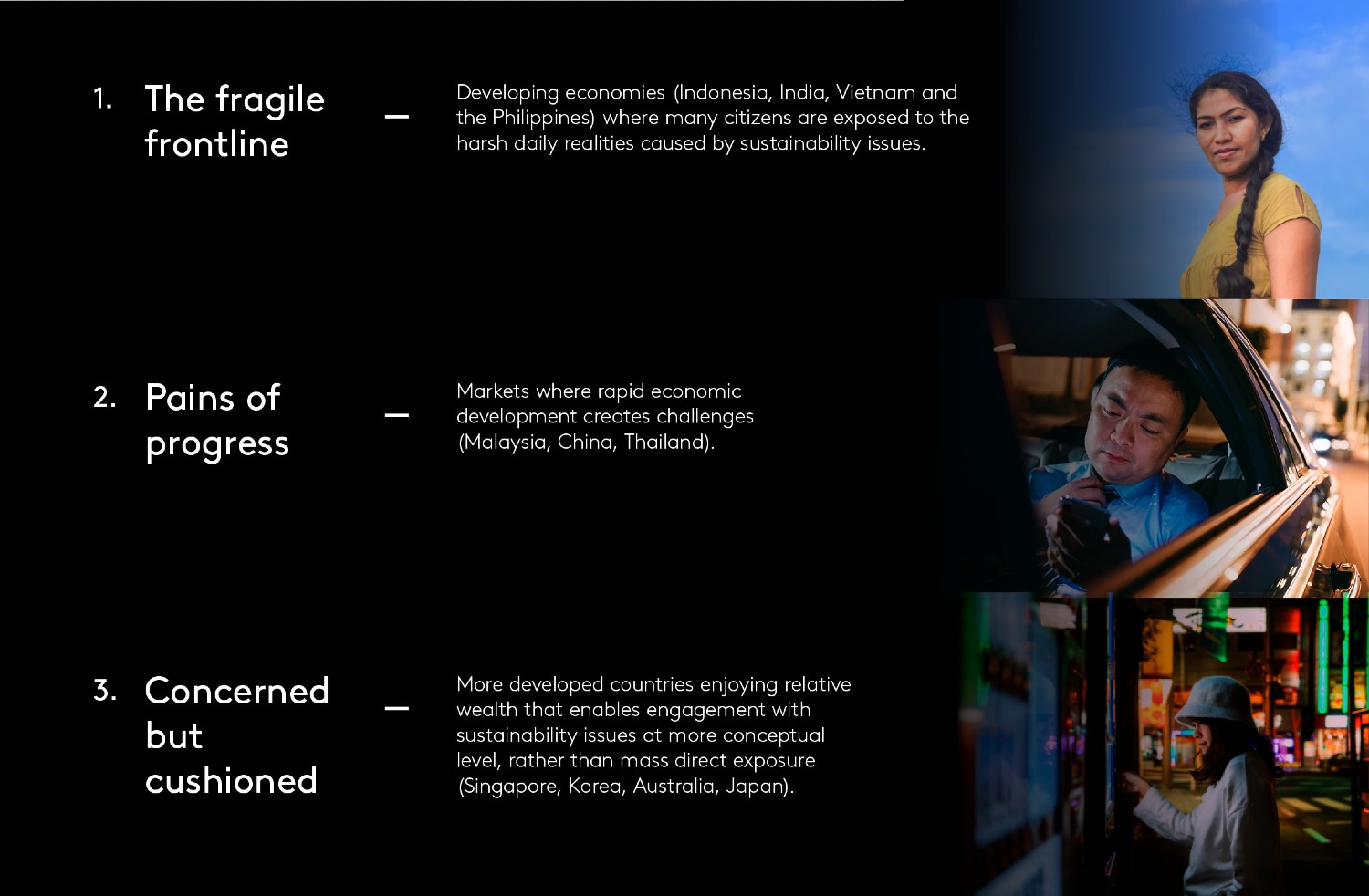With $1 trillion the magic figure projected for the economic benefits of going green in South-East Asia by 2030, getting sustainable transformation right is an obvious business opportunity. But with over 3 in 5 Asians worried that brands are involved in social issues just for commercial reasons, there’s a more powerful story at play. And brands that demonstrate leadership and authenticity at an intrinsic level will resonate. The era of corporate social responsibility and ticking the recycling box is long gone.
For your brand to lead with purpose, your sustainable transformation mantra must talk to and deliver localised stories that clearly show your brand’s value to society. Asia is a kaleidoscope of cultures, where water and air pollution and extreme weather events poll as some of the most important sustainability issues across the region. Yet local nuances drive very different priorities when it comes to which issues have a direct impact on citizens’ daily lives. Diving deeper illustrates further disparity on the issues of importance to consumers, as shown below.

Kantar’s Asia Sustainability Foundational Study 2021 found that the region can be segmented into three distinct market profiles to better understand the realities of sustainable transformation needs in individual countries. It is vital that brands show how they can help address these key issues, with almost 3 in 5 Asians are prepared to invest their time and money to support businesses that do good.

No matter the market, those issues closest to home will always take precedence
Experience of environmental issues and structural social inequalities is real and raw in many Asian markets. While sustainable priorities may appear to align across markets, in reality global issues become most relevant when framed in a local context – and that is where the stories differ. Broadly, the issues important to people in each country are closely related to their levels of economic development. It is how issues manifest at a local market level that really matter.
In the fragile frontline developing countries, consumer concern relates to how people experience or see harsh societal realities – such as poverty and hunger in the Philippines, and water pollution in Vietnam.
In developing countries, a mix of challenges caused by rapid economic development, such as lack of access to healthcare and vaccinations in Malaysia and worries about carbon emissions in Thailand, drive sustainable consciousness.
And in developed wealthier countries, engagement with issues is set against a broader appreciation of responsibility to address environmental issues – extreme weather is talked in context of the wider issue of climate change and its impact on clean air and food production.
Global issues are most relevant when contextualised in a local cultural context
COVID-19 has been a leveller. It has also taught us that, as brands and businesses, it is imperative to learn how to adapt engagement and apply initiatives in individual markets at a moment in time – and listen to your consumer, because it is those issues that are closest to home that must take precedence.
Hence, whilst recyclable packaging initiatives are a good step, they are becoming a hygiene factor to the consumer – only if brands show how these packaging initiatives will help solve wider environmental issues will brands really resonate strongly with consumers.
For example, in developing Asia, first-hand experience of environmental issues and fundamental social deficiencies are a reality– and for many people, they equate to survival. How can your brand tackle a community problem? Answer that and consumers will see the real value of your brand. Across the region, talk to the specifics of issues that matter in individual markets and you’ll be on the transformation journey to driving stronger engagement by creating a positive movement for and with consumers.
Click here more information on the report and learn how your organisation can start to take effective and informed steps to successfully navigate your sustainable journey.
Kantar’s Sustainable Transformation Practice brings together expertise and assets from across Kantar through a framework of six key pillars. This supports organisations across the spectrum of sustainability challenges in order to meaningfully define and powerfully activate sustainability strategy.


